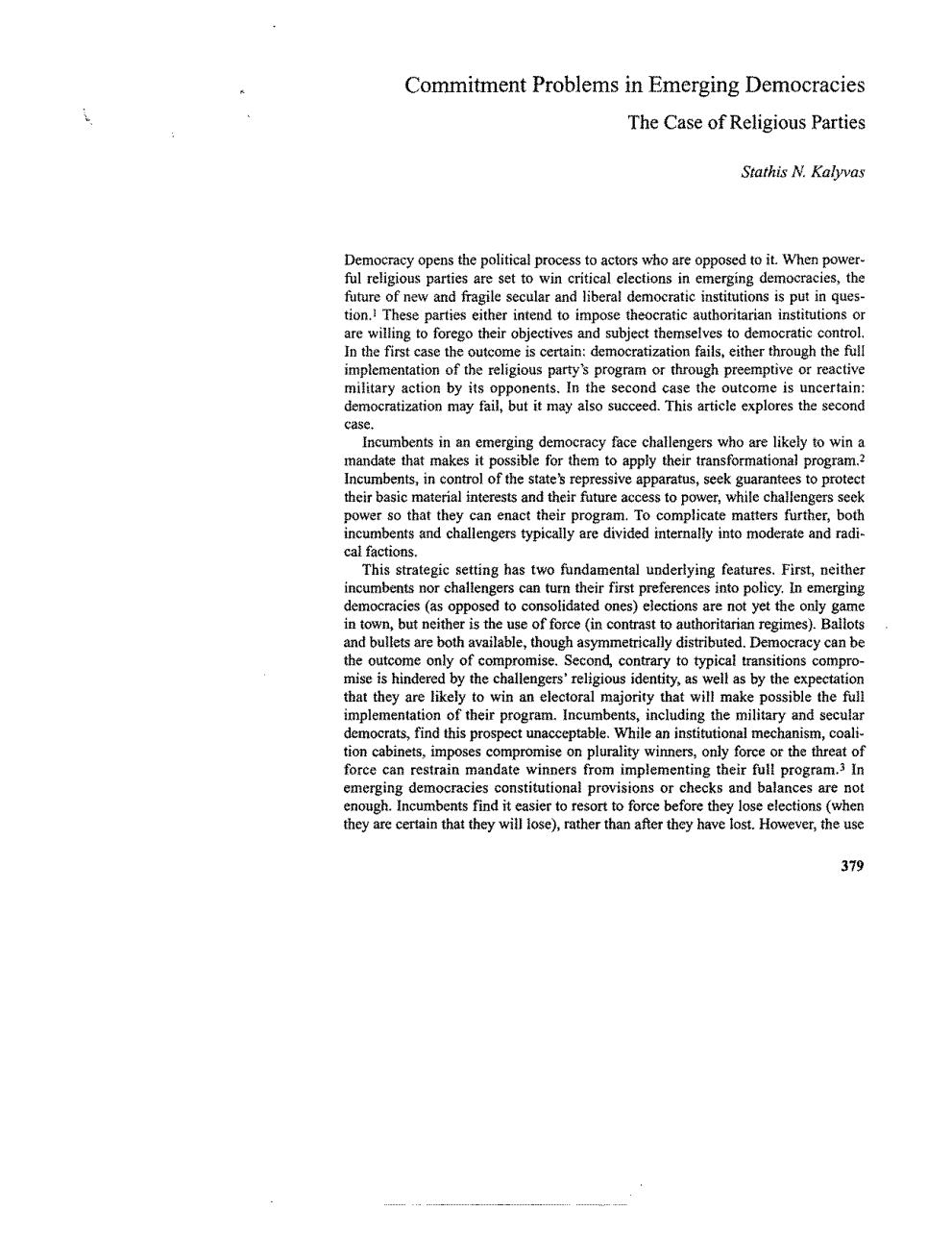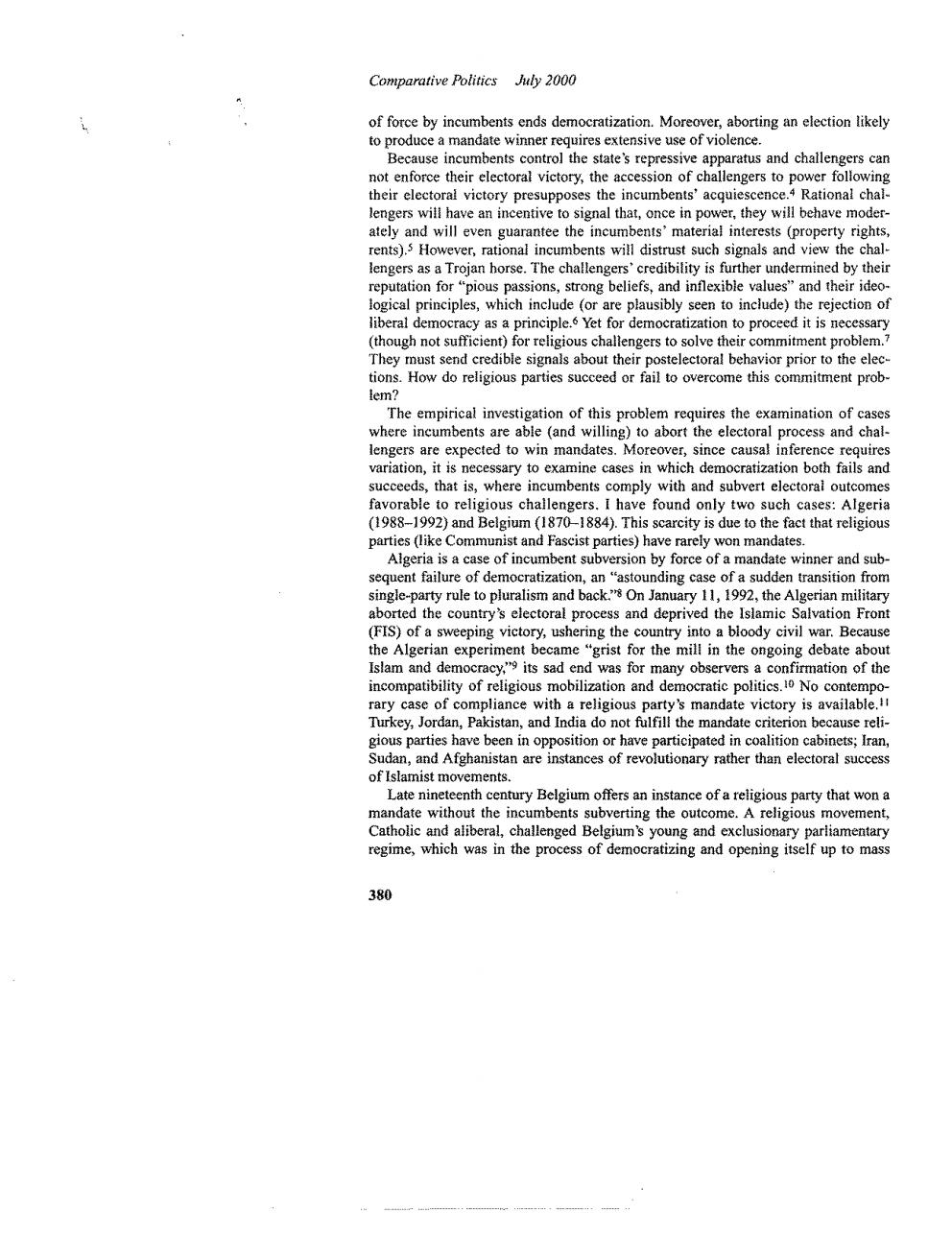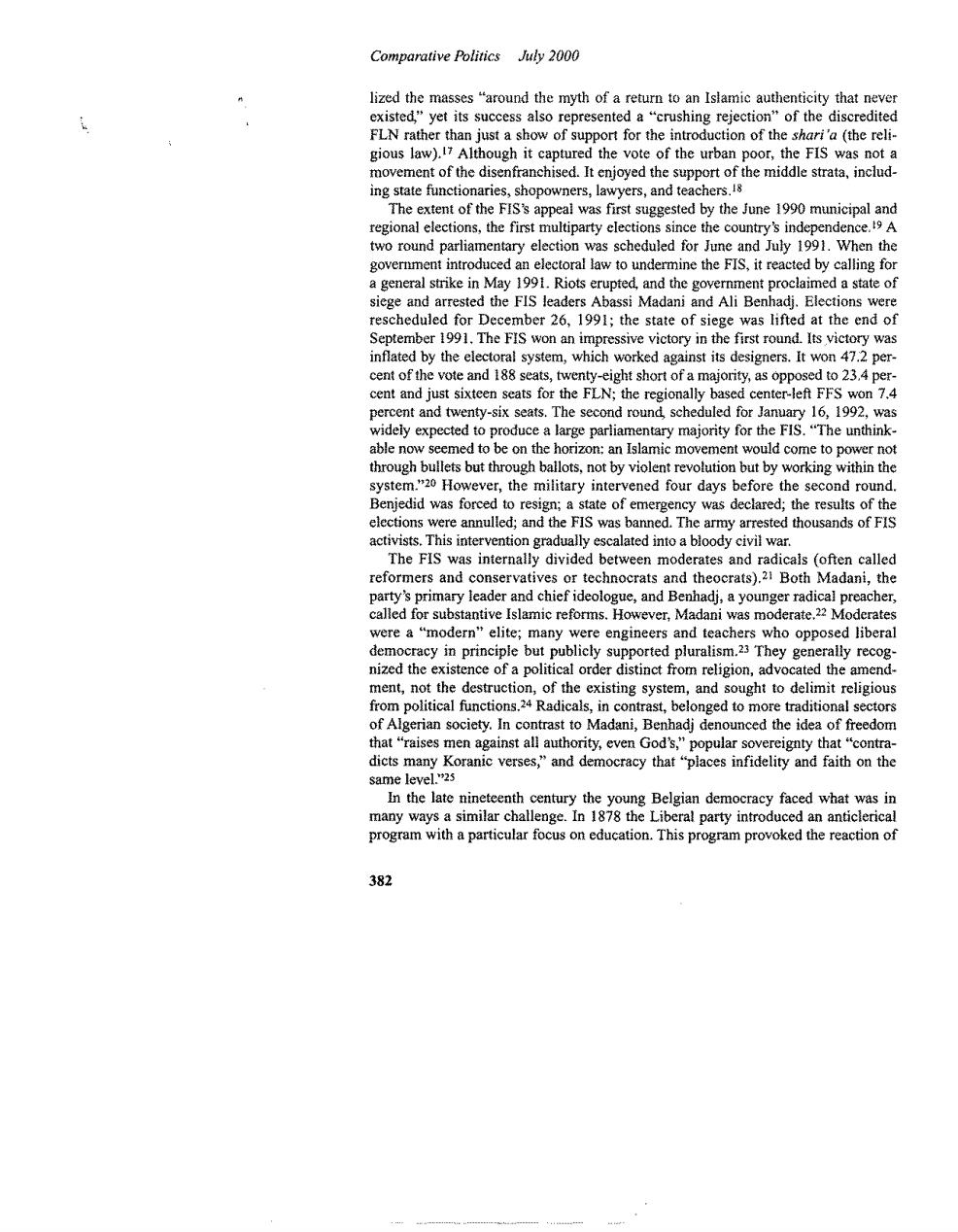
Commitment Problems in Emerging Democracies The Case of Religious Parties Stathis N.Kalyvas Democracy opens the political process to actors who are opposed to it.When power- ful religious parties are set to win critical elections in emerging democracies,the future of new and fragile secular and liberal democratic institutions is put in ques- tion.!These parties either intend to impose theocratic authoritarian institutions or are willing to forego their objectives and subject themselves to democratic control. In the first case the outcome is certain:democratization fails,either through the full implementation of the religious party's program or through preemptive or reactive military action by its opponents.In the second case the outcome is uncertain: democratization may fail,but it may also succeed.This article explores the second case. Incumbents in an emerging democracy face challengers who are likely to win a mandate that makes it possible for them to apply their transformational program.2 Incumbents,in control of the state's repressive apparatus,seek guarantees to protect their basic material interests and their future access to power,while challengers seek power so that they can enact their program.To complicate matters further,both incumbents and challengers typically are divided internally into moderate and radi- cal factions. This strategic setting has two fundamental underlying features.First,neither incumbents nor chaliengers can turn their first preferences into policy.In emerging democracies (as opposed to consolidated ones)elections are not yet the only game in town,but neither is the use of force (in contrast to authoritarian regimes).Ballots and bullets are both available,though asymmetrically distributed.Democracy can be the outcome only of compromise.Second,contrary to typical transitions compro- mise is hindered by the challengers'religious identity,as well as by the expectation that they are likely to win an electoral majority that will make possible the full implementation of their program.Incumbents,including the military and secular democrats,find this prospect unacceptable.While an institutional mechanism,coali- tion cabinets,imposes compromise on plurality winners,only force or the threat of force can restrain mandate winners from implementing their full program.3 In emerging democracies constitutional provisions or checks and balances are not enough.Incumbents find it easier to resort to force before they lose elections (when they are certain that they will lose),rather than after they have lost.However,the use 379

Comparative Politics July 2000 of force by incumbents ends democratization.Moreover,aborting an election likely to produce a mandate winner requires extensive use of violence. Because incumbents control the state's repressive apparatus and challengers can not enforce their electoral victory,the accession of challengers to power following their electoral victory presupposes the incumbents'acquiescence.4 Rational chal- lengers will have an incentive to signal that,once in power,they will behave moder- ately and will even guarantee the incumbents'material interests(property rights, rents).5 However,rational incumbents will distrust such signals and view the chal- lengers as a Trojan horse.The challengers'credibility is further undermined by their reputation for "pious passions,strong beliefs,and inflexible values"and their ideo- logical principles,which include (or are plausibly seen to include)the rejection of liberal democracy as a principle.6 Yet for democratization to proceed it is necessary (though not sufficient)for religious challengers to solve their commitment problem.? They must send credible signals about their postelectoral behavior prior to the elec- tions.How do religious parties succeed or fail to overcome this commitment prob- lem? The empirical investigation of this problem requires the examination of cases where incumbents are able(and willing)to abort the electoral process and chal- lengers are expected to win mandates.Moreover,since causal inference requires variation,it is necessary to examine cases in which democratization both fails and succeeds,that is,where incumbents comply with and subvert electoral outcomes favorable to religious challengers.I have found only two such cases:Algeria (1988-1992)and Belgium (1870-1884).This scarcity is due to the fact that religious parties (like Communist and Fascist parties)have rarely won mandates. Algeria is a case of incumbent subversion by force of a mandate winner and sub- sequent failure of democratization,an"astounding case of a sudden transition from single-party rule to pluralism and back"On January 11,1992,the Algerian military aborted the country's electoral process and deprived the Islamic Salvation Front (FIS)of a sweeping victory,ushering the country into a bloody civil war.Because the Algerian experiment became"grist for the mill in the ongoing debate about Islam and democracy,"9 its sad end was for many observers a confirmation of the incompatibility of religious mobilization and democratic politics.10 No contempo- rary case of compliance with a religious party's mandate victory is available.i Turkey,Jordan,Pakistan,and India do not fulfill the mandate criterion because reli- gious parties have been in opposition or have participated in coalition cabinets;Iran, Sudan,and Afghanistan are instances of revolutionary rather than electoral success of Islamist movements. Late nineteenth century Belgium offers an instance of a religious party that won a mandate without the incumbents subverting the outcome.A religious movement, Catholic and aliberal,challenged Belgium's young and exclusionary parliamentary regime,which was in the process of democratizing and opening itself up to mass 380

Stathis N.Kalyvas participation.The Catholic party,which for the first time included both moderate parliamentarians and grass-roots radicals,won the critical 1884 elections. Incumbents bowed to the electoral outcome even though they had the power to abort it.In turn,the Catholic party,despite the introduction of clerical reforms,did not apply its program in full or question Belgium's secular/liberal institutions.Catholics were incorporated into the liberal order,and religious mobilization proved compati- ble with democratization.Although religious parties arose in other European coun- tries during the late nineteenth century,none won a parliamentary majority.12 In the twentieth century authoritarian pro-Catholic movements ruled in Spain,Portugal, and Austria through military coups,not elections. The difficulty of isolating causality in a small-N comparison (overdetermina- tion)is well-known.However,a comparison designed around an analytical puzzle has the advantage of suggesting causal mechanisms and crucial variables that other- wise would be overlooked.Examination of these two cases in parallel does not imply their similarity in every respect.While they are different in many ways,they share a similar strategic setting.Comparison allows the identification of a key, though not obvious,factor in processes of democratization:the structure of reli- gious institutions.13 Credibility can be signaled by dramatic actions,such as a party's public denunciation of its central ideological planks (the Godesberg effect) and the purge of prominent radicals.14 Centralized,autocratic,and hierarchical reli- gious structures allow religious parties,which are typically young and divided,to implement such measures and overcome their commitment problem by credibly sig- naling future compliance. This comparison is limited to the analysis of a particular and well-defined strate- gic situation.It is not a full-fledged exploration of every facet of the process of democratization or a comprehensive examination of the two countries.After a brief description of Algeria and Belgium it examines two major explanations of the failure of democratization in Algeria and the implications of Belgian democratization. Algeria and Belgium The FIS appeared on the Algerian political scene in October 1988.In the aftermath of mass demonstrations against the regime's corruption the ruling party,the National Liberation Front(FLN),initiated a gradual process of liberalization.The constitution was revised to end one party rule,and the FIS was authorized in September 1989. Using both mosques and modern communications to propagate its message,the FIS evolved into a mass movement that combined electoralism with mass mobilization, giving rise to a veritable countersociety.Is It blended a critique of the regime with a utopian project:the "Islamic solution"and the Islamic state.This project was explic- itly aliberal and antidemocratic,but was also vague and malleable.16 The FIS mobi- 381

Comparative Politics July 2000 lized the masses"around the myth of a return to an Islamic authenticity that never existed,"yet its success also represented a "crushing rejection"of the discredited FLN rather than just a show of support for the introduction of the shari'a(the reli- gious law).17 Although it captured the vote of the urban poor,the FIS was not a movement of the disenfranchised.It enjoyed the support of the middle strata,includ- ing state functionaries,shopowners,lawyers,and teachers.18 The extent of the FIS's appeal was first suggested by the June 1990 municipal and regional elections,the first multiparty elections since the country's independence.19A two round parliamentary election was scheduled for June and July 1991.When the government introduced an electoral law to undermine the FIS,it reacted by calling for a general strike in May 1991.Riots erupted,and the government proclaimed a state of siege and arrested the FIS leaders Abassi Madani and Ali Benhadj.Elections were rescheduled for December 26,1991;the state of siege was lifted at the end of September 1991.The FIS won an impressive victory in the first round.Its victory was inflated by the electoral system,which worked against its designers.It won 47.2 per- cent of the vote and 188 seats,twenty-eight short of a majority,as opposed to 23.4 per- cent and just sixteen seats for the FLN;the regionally based center-left FFS won 7.4 percent and twenty-six seats.The second round,scheduled for January 16,1992,was widely expected to produce a large parliamentary majority for the FIS."The unthink- able now seemed to be on the horizon:an Islamic movement would come to power not through bullets but through ballots,not by violent revolution but by working within the system."20 However,the military intervened four days before the second round. Benjedid was forced to resign;a state of emergency was declared;the results of the elections were annulled;and the FIS was banned.The army arrested thousands of FIS activists.This intervention gradually escalated into a bloody civil war The FIS was internally divided between moderates and radicals (often called reformers and conservatives or technocrats and theocrats).21 Both Madani,the party's primary leader and chief ideologue,and Benhadj,a younger radical preacher, called for substantive Islamic reforms.However,Madani was moderate.22 Moderates were a "modern"elite;many were engineers and teachers who opposed liberal democracy in principle but publicly supported pluralism.23 They generally recog- nized the existence of a political order distinct from religion,advocated the amend- ment,not the destruction,of the existing system,and sought to delimit religious from political functions.24 Radicals,in contrast,belonged to more traditional sectors of Algerian society.In contrast to Madani,Benhadi denounced the idea of freedom that "raises men against all authority,even God's,"popular sovereignty that"contra- dicts many Koranic verses,"and democracy that "places infidelity and faith on the same level."25 In the late nineteenth century the young Belgian democracy faced what was in many ways a similar challenge.In 1878 the Liberal party introduced an anticlerical program with a particular focus on education.This program provoked the reaction of 382

Stathis N.Kalyvas the Catholic church,the polarization of polities,and the mass mobilization of Catholics.Boosted by this mobilization,the rejuvenated Catholic party won a large electoral victory in 1884 on the basis of a clerical program.Like the Algerian FIS, the Belgian Catholics were initially divided between the moderate parliamentarians of the Conservative party and radical (ultramontane)grass-roots activists.As a Belgian politician pointed out in 1879,"there are two Catholic parties,one favorable and the other hostile to the [liberal]constitution."26 The Catholic movement emerged during the 1860s but grew fast after 1878 to challenge the liberal (but nondemocratic)Belgian institutions.27 As a contemporary observer put it,"a whole army of publicists emerged,pretending that there existed a radical incompatibility between the Belgian constitution and Catholicism,between the country's religion and its political organization."28 This movement openly reject- ed liberalism and the separation between the religious and civil spheres.It called for the overthrow of the liberal order,defined as"the negation of the supernatural order applied to politics,exclusion of all religious influence in social relations,full eman- cipation of social power from divine revelation."29 The constitution was rejected. "We believe,together with the Church and like the Church,that the principles which flow from the Belgian Constitution are false and subversive,that the separation of Church and State is bad,and that the Constitution,in itself,is bad."30 This movement was supported by the lower clergy,controlled almost all the Catholic press,and built a large network of popular associations. Moderate Catholics could be found mostly among the parliamentarians of the Conservative party.Their ideal was,as one of their leaders put it,a "Christian monarchy,"but they were willing to compromise and"loyally accept"the liberal constitution,"a situation which is quite away from this ideal."31 They justified this choice in strategic rather than ideological terms,arguing that"it is more prudent and political to seek not the absolute,but more modestly,the possible and the relative.32 "By wanting that which we regard as the absolute good,we often jeopardize and lose the relative good."33 Although the moderates controlled the parliamentary party,they were weak at the grass roots,where the radicals agitated for the formation of a"truly Catholic party." A vehement conflict erupted between the two factions.At stake was the definition of political Catholicism and control of the Catholic party.Moderates accused radicals of being "very incompetent"and"unsuited for public life,"34 of"exercising a kind of terrorism on many Catholics"by "denouncing the moderates as semi-heretics,"35 of seeking"to substitute constitutional politics with theological ones,"and of aspiring "to overthrow all our political organization"by "unfurling a revolutionary flag."36 They demanded that the radicals abandon their maximalist discourse."In Belgium now...the Constitution is approved and legitimate,and is a good thing;Catholics can not obviously adopt these institutions for ever,but they can declare that they do not intend to use force in order to achieve any change."37 The radicals refused to comply 383